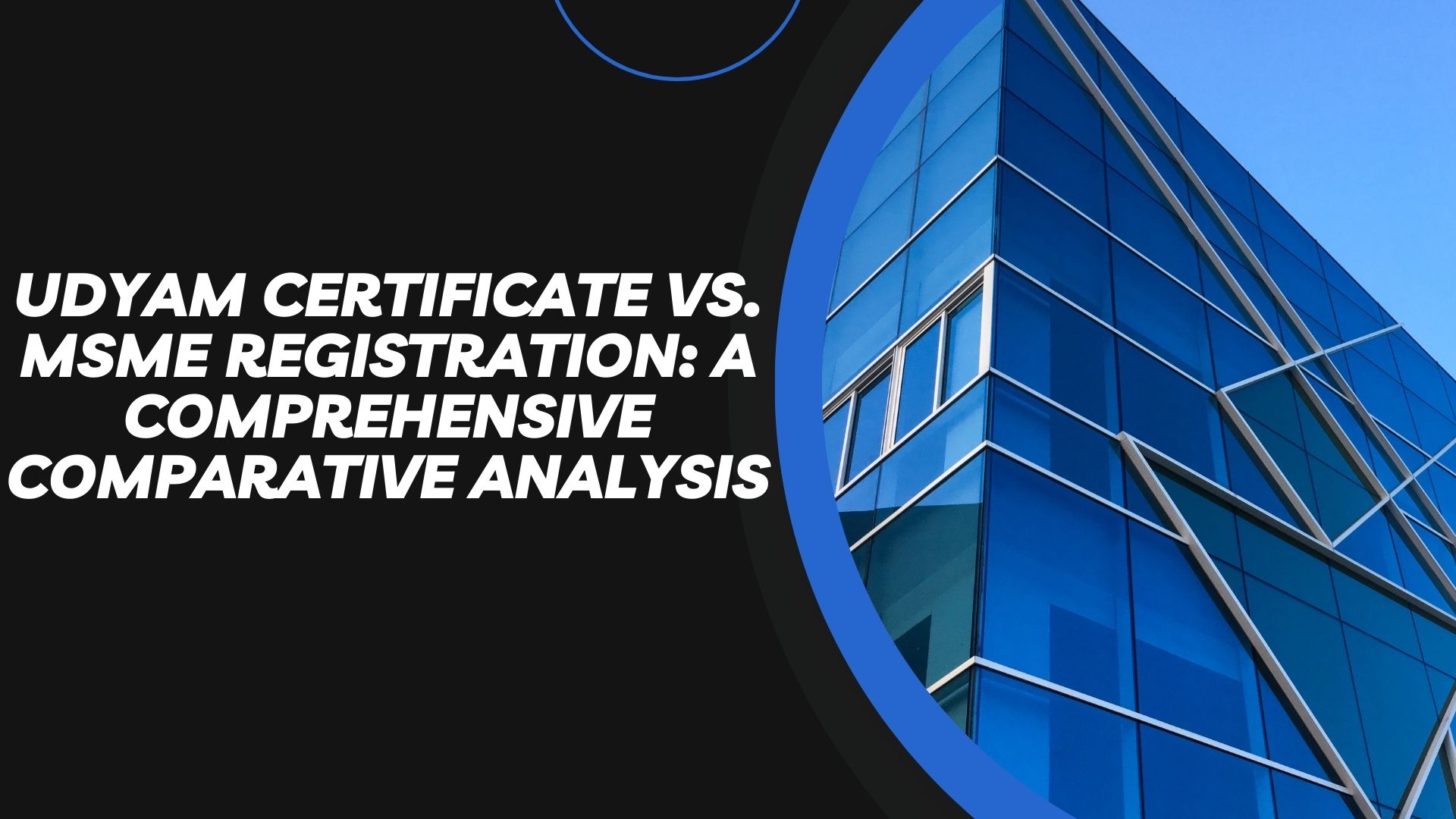Introduction
The Indian government has long recognized the importance of micro, small, and medium enterprises (MSMEs) in driving economic growth, generating employment, and promoting entrepreneurship. To support and uplift these vital contributors to the Indian economy, various schemes and registrations have been introduced. Two of the most prominent ones are the Udyam Certificate and MSME Registration. While they both aim to provide benefits to MSMEs, they differ in several key aspects. In this comprehensive comparative analysis, we will delve into the intricacies of Udyam Certificate and MSME Registration, examining their eligibility criteria, advantages, application processes, and implications for businesses.
Understanding Udyam Certificate
The Udyam Registration, introduced in 2020, is an online process that provides MSMEs with the Udyam Certificate. This certificate replaces the earlier system of MSME Registration and comes with several noteworthy features.
Eligibility Criteria for Udyam Certificate
- Manufacturers and service providers can apply for the Udyam Certificate.
- The business should fall under the MSME classification based on investment in plant and machinery or equipment, or turnover.
- Sole proprietorships, partnerships, Hindu Undivided Families (HUFs), and companies can apply.
Advantages of Udyam Certificate
Ease of Registration:
The online application process is user-friendly and can be completed swiftly.
No Renewal Required:
Unlike the previous MSME Registration, the Udyam Certificate does not require periodic renewal. Once obtained, it remains valid.
Access to Government Schemes:
Udyam-registered businesses gain access to various government schemes, subsidies, and incentives, fostering growth.
Bank Loans:
The certificate simplifies the loan application process, making it easier for MSMEs to secure credit from financial institutions.
Market Expansion:
Udyam Registration aids in expanding the market reach by offering benefits in government tenders and procurement processes.
Understanding MSME Registration
Before the introduction of the Udyam Certificate, the MSME Registration was the primary means for MSMEs to avail benefits and incentives. While the Udyam Certificate has largely replaced this system, it is essential to understand its key features for a comprehensive comparison.
Eligibility Criteria for MSME Registration
- Manufacturers and service providers could apply for MSME Registration.
- The classification was based on investment in plant and machinery or equipment, or turnover.
- Sole proprietorships, partnerships, Hindu Undivided Families (HUFs), and companies were eligible.
Advantages of MSME Registration
Historical Benefits:
Many MSMEs with existing MSME Registrations continue to enjoy the benefits under this scheme.
Government Tenders:
MSME-registered businesses were eligible for price preference in government tenders, which may still be applicable in certain cases.
Tax Benefits:
MSME Registration could be used for claiming tax rebates and exemptions.
Credit Facilities:
Banks and financial institutions recognized MSME Registration for lending purposes.
Comparative Analysis
Now, let’s compare Udyam Certificate and MSME Registration based on various parameters:
Application Process:
Udyam Certificate wins in terms of simplicity and efficiency, as it is entirely online and does not require periodic renewal. MSME Registration, on the other hand, involved manual paperwork and renewal every few years.
Eligibility:
Both schemes have similar eligibility criteria, making them accessible to a wide range of businesses.
Advantages:
The Udyam Certificate offers more contemporary benefits, such as easy access to government schemes and subsidies, while MSME Registration may still have relevance for those with existing registrations.
Market Expansion:
Udyam Certificate provides a broader scope for market expansion due to its focus on government procurement and subsidies.
Loan Facilities:
Both Udyam Certificate and MSME Registration facilitate easier access to credit, but the former is more streamlined.
Tax Benefits:
MSME Registration was used for tax benefits, while Udyam Certificate’s tax-related implications may evolve over time.
Challenges and Considerations
While the Udyam Certificate and MSME Registration offer several advantages to businesses, there are also challenges and considerations to keep in mind when choosing between the two:
Transition:
Businesses that were previously registered under MSME Registration may need to transition to the Udyam Certificate system. This transition can involve updating business details and understanding the new benefits and implications.
Taxation:
Tax benefits and exemptions related to MSMEs may differ under the Udyam Certificate regime. It is crucial for businesses to consult with tax professionals to understand the tax implications of both registrations fully.
Bureaucratic Changes:
Government schemes and regulations can evolve over time. Businesses must stay updated on changes in eligibility criteria, benefits, and compliance requirements for both Udyam Certificate and MSME Registration.
Legacy Benefits:
Some businesses may still benefit from legacy advantages associated with MSME Registration. They should carefully assess whether switching to the Udyam Certificate is in their best interest.
Industry-Specific Considerations:
Certain industries may have unique requirements and incentives. Businesses should consider how Udyam Certificate and MSME Registration align with their industry-specific needs.
Compliance and Reporting:
Both Udyam Certificate and MSME Registration require businesses to comply with specific reporting and compliance norms. It is crucial to understand these requirements to avoid any penalties or issues.
Future Outlook
As the Indian government continues to support the growth of MSMEs and streamline registration processes, it is likely that the Udyam Certificate system will become the standard for new registrations. However, for businesses with existing MSME Registrations, understanding the implications and benefits of transitioning to the Udyam Certificate is essential.
The government’s commitment to the MSME sector remains strong, and businesses can expect ongoing support in the form of incentives, subsidies, and access to credit. Staying informed about policy changes and seeking professional advice when needed will be crucial for businesses looking to maximize the advantages of these registrations.
See Also: Update Udyam Certificate
Conclusion
The Udyam Certificate and MSME Registration are both valuable tools that aim to promote and empower micro, small, and medium enterprises in India. While the Udyam Certificate offers a more streamlined and modernized approach, the choice between the two registrations depends on factors such as the business’s history, industry, and specific requirements.
Ultimately, businesses should carefully assess their unique needs, consult with experts, and keep themselves updated on government policies and schemes to make an informed decision. Whether opting for the Udyam Certificate or continuing with MSME Registration, both registrations play a pivotal role in supporting the growth and sustainability of MSMEs in India, contributing to the nation’s economic development.





